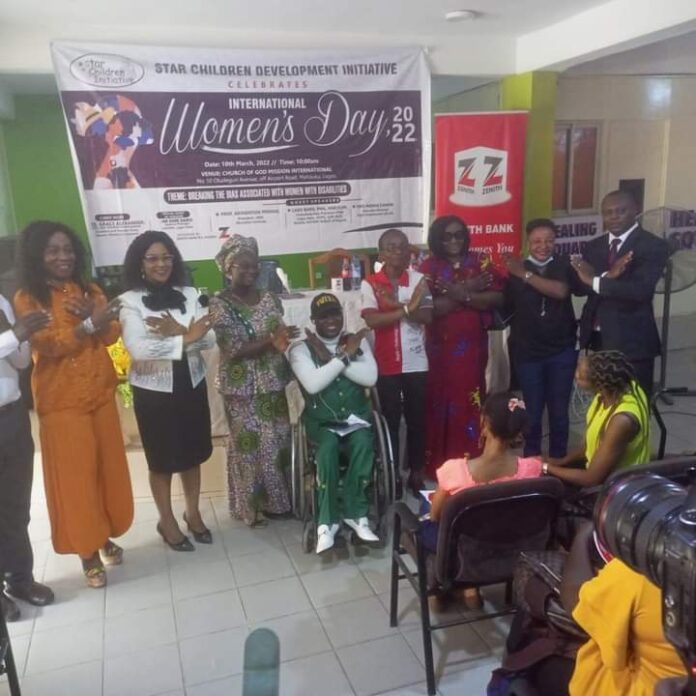Women with Disabilities in Nigeria have been encouraged to be bold and courageous to break the barriers that have made them unproductive.
The CEO, Star Children Development Initiative (SCDI), Grace Alexander made this call on Thursday 10th March, 2022 when SCDI with the support of Zenith Bank organized a One Day conference in Lagos to commemorate the International Women’s Day with the theme “Breaking The Bias Associated with Women With Disabilities(WWDs).
Grace Alexander who is also the convener of Every Woman Matters UK, while speaking via zoom said that Women With Disabilities (WWDs) have not been given access to health, employment and other things that make life easier and WWDs are not been recognized as women, their voices are not heard.
“They are viewed as unproductive, asexual and they are highly discriminated upon more than their male counterparts and other women without disabilities. This has demoralized a lot of them making them feel less human.
“A good number of them have been facing different form of abuses including sexual abuse, exclusion in socio, economic and political sphere of life”
She encouraged them with these words “We are productive, sexual, bold, powerful, courageous and foremost We are Women”.
Speaking further, she said that the gathering is to help and change these biases associated with WGWDs. To achieve paradigm shift with professionals understanding what is expected of them, parents of persons with disabilities internalizing the barriers, biases, stigmas, myths and the thinking that having a child with disability is a tragedy.
She cited example with herself “I am a proud mother of a young man with disability (we call him Professor) he is 27 years old and my last son, a wonderful son who made me to see the world differently”.
She counselled that all of us have habits hidden in our minds which we should deal with to enable us contribute meaningfully to change the narrative.
“Every citizen around the globe should adopt systems that will enable every woman with disability to participate fully in the scheme of things”.
Ifeolu Akintunde while celebrating all women especially Women and Girls With Disabilities (WGWDs), informed that 60 percent of the world population are women but unfortunately, women are less paid, less recognized, and less celebrated for all their achievements. Yet they keep the home running, active in business and gradually their recognition is increasing because some leaders in the political sphere are women.
He described unrecognized women as heroes and WWDs are the greater heroes.
“They are not recognized like others which is a challenge but it is not a hopeless situation because they can draw strength from women or WWDs who are doing great things?”.
He urged WWDs should see themselves as greater heroes, it doesn’t matter what others think about them.
He advised the other people should search their mind and remove those things that makes them see others as less equal. This will help the see others even with disability as equal.
“We may look different but we are equal. Those thought are only imaginations but not reality, removing them will enhance equality and lack of bias”.
Mr. Dare Dairo, GM LASODA who was the special guest of honour at the event while appreciating the organizers of the event said that in spite all the fact that women are more than men in number, women have not been given much opportunity to thrive but the narrative is changing, many women are breaking the barriers including WWDs.
Even though these challenges are strong and intimidating, many women are rewriting the trend.
He encouraged WWDs to work harder, become smarter, develop good communication skills which will lead them to opportunities and go out there and break the barriers.
TQM reports that the event which was well attended by persons with disabilities, parents with persons with disabilities, and professionals was moderated by leader in the disability community, Raheem Yusuf Olatunji.
TQM reports that interesting topics such as i. Stigma & Stereotypes are multifaceted constructs in our community: How can we use laws and policies to reduce structural stigma and stereotypes for women and girls with disabilities in Nigeria?, ii. The intersectionality between the bias associated with women & girls with Disabilities and Trauma? What are the interventions that can be adopted? And iii. What are the barriers that prevent women with disabilities in participating in leadership? How can we break the barriers were taken by Immediate past Chairperson, FIDA, Lagos State, Lady Barr. Phil Nneji(JP), The President, Jars Education Institute, Prof Akindotu Merino, and Morin Carew, The Executive Director of Right Impressions Ltd respectively.
TQM also reports that there was panel session where persons with disabilities, parents of parents with disabilities and some professional shared their experiences on the areas of system where barriers exist and how to break the barriers.


